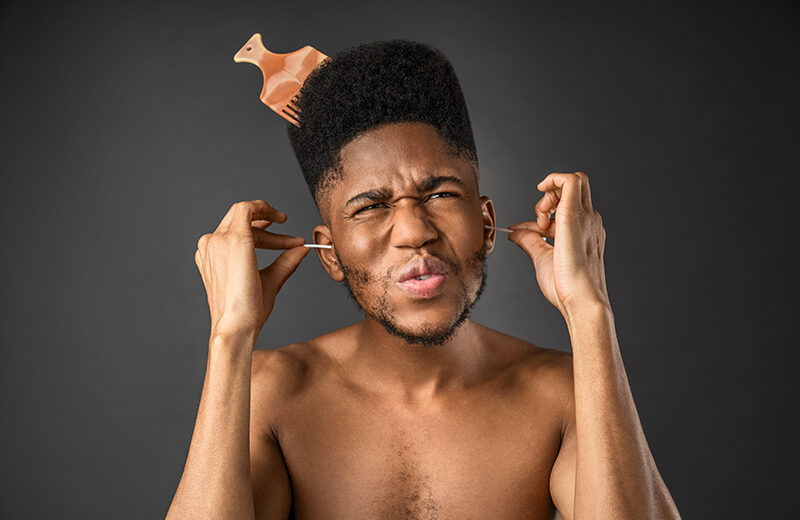Itching is one of the most uncomfortable physical sensations, often second only to pain. It can be a source of annoyance, distraction, and, at times, extreme discomfort. The plight of itching in a hard-to-reach location poses challenges in finding relief. The ear canals are particularly susceptible to such unreachable itching. However, it is crucial to exercise caution and refrain from succumbing to the urge to scratch, as the delicate ear canal and eardrum are highly vulnerable to damage from foreign objects. Fortunately, measures can be taken to alleviate an itchy ear or even prevent this discomfort.
Why Do I Have An Itchy Ear?
Earwax Proliferation
It is essential to be aware that earwax buildup is not limited to specific individuals. While earwax production may vary among individuals, several factors, such as trauma, scar tissue, the presence of large debris in the ear canal, and the use of earbuds, earplugs, or hearing aids, may contribute to the development of earwax buildup.
When earwax accumulates, it has the potential to trap water in the ear canal, causing inflammation, irritation, and subsequent itchiness. It is imperative to refrain from using cotton swabs, pens, or similar objects to mitigate itching in the ear. One viable over-the-counter remedy involves utilizing commercial eardrops formulated to soften wax, thereby facilitating the clearance of ear buildup and alleviating itching. Should the use of eardrops fail to provide relief, engaging the services of a hearing care professional is recommended. These professionals possess the requisite expertise, specialized tools, and knowledge to safely address earwax buildup without inducing ear canal or eardrum injury.
Allergies
One common cause of itching in the inner ear is allergies. When the body confronts an allergen, it discharges histamines, acting as a defense mechanism to eliminate the allergens. This can manifest as itchy skin, watery eyes, and an increased frequency of sneezing.
The presence of histamines may lead to a stoppage of the Eustachian tube in the middle ear, resulting in an itchiness sensation. While it may be tempting to alleviate the itchiness by manipulating the tragus, it is advisable to use an antihistamine as the most effective home remedy.
Eczema and Psoriasis
Two prevalent skin conditions are eczema and psoriasis, which can affect the ears in addition to the more commonly recognized symptoms such as visible scaling and inflammation. If an individual with either of these conditions experiences an ear itch or observes scaling, it is advisable to consult a healthcare provider. Management of these concerns necessitates a tailored approach, requiring collaboration between the individual’s hearing care provider and dermatologist.
Ear Infection
If an individual experiences persistent, intense itching in the ear or is accompanied by throbbing, it may indicate bacterial accumulation in the middle ear, potentially leading to a full-fledged ear infection. It is advisable to schedule an appointment with an audiologist to address these symptoms. The audiologist may involve a family doctor in formulating an appropriate course of treatment. Timely intervention can help prevent further discomfort and complications.
Stress and Anxiety
When one experiences embarrassment, it often manifests as blushing, while nervousness can lead to hives. Similarly, anxiety may trigger an itching sensation due to its impact on the nervous system. Notably, stress or anxiety can result in deep itching within the ears. To alleviate anxiety, various methods, such as deep breathing practices and listening to calming music, are readily available. Additionally, dilating blood vessels and improving ear circulation from a hot shower or consuming hot tea can be beneficial. However, seeking consultation from a hearing care provider to rule out causes other than anxiety for the itching is imperative.
Preventing Itchy Ears
Proper ear hygiene and avoidance of allergens are crucial if you want to prevent an itchy ear. We advise avoiding attempting to clean the ears at home, as this may exacerbate the situation. Earwax plays a critical role in ear health by providing waterproofing and microbial resistance to the ear canal. Gently cleaning the exterior of the ear with a soft washcloth and warm water is recommended to eliminate excess wax and debris, thus mitigating the risk of dermatitis.
For individuals wearing earrings, stick to hypoallergenic metals such as pure gold, sterling silver, or titanium to help prevent skin reactions. It is also essential to minimize the entry of excess water into the ears, particularly when swimming or bathing, and to use a shampoo formulated for sensitive skin to reduce the likelihood of ear irritation. Additionally, avoidance of allergens, adherence to allergy treatment plans, and cautious and gentle insertion of hearing aids, earbuds, or any other ear-worn devices, ensuring their cleanliness, are emphasized. Any object inserted into or near the ear canal may disrupt its natural biome.





